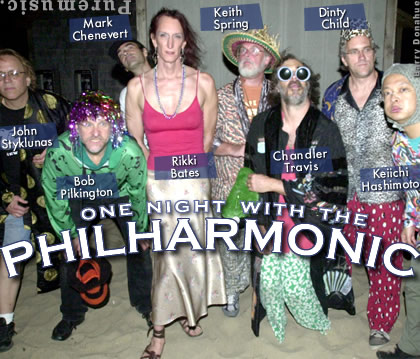
A Conversation with Chandler Travis (continued)
CT: Well, the Philharmonic is all about the players. I mean, obviously, there's a lot of songwriting things going on and whatever, but it wouldn't exist, literally, at all, without the players. The players came first. I never would have started a horn band on purpose.
PM: So how did it, then, literally begin? Was it you and Dinty Child at first?
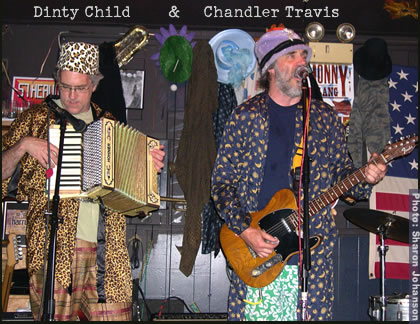
CT: Yeah. There's something on our bio about it. It was just Dinty had some kind of series in Cambridge where he sort of had a rhythm section. I don't know if it was one night a week, he would have different guys some down and sort of guest star in front of this rhythm section. And it was his habit to ask occasionally, "What else would you like? Is there something else we could throw in there?" And I think just because I probably didn't have a real idea, and also maybe because there were a couple of songs I'd written right around then that sort of had me thinking about horns a little bit, but I think it was probably more of a devil's advocate thing than anything else, I just said, "Yeah, well, let's do some horns." I mean, at the time it was--I mean, I've always thought of horns and also girl background singers as the last gasp of the aging rock 'n' roll band.
PM: [laughs]
CT: There are so many guys that have done such awful work with just lopping those things on after they've stopped writing anything that makes any sense.
PM: Yeah, right.
CT: I love Stax.
PM: Can't go wrong.
CT: Oh, great fuckin' band. I mean, I'll listen to those records all day, and it's great. But there's more than one way to look at horns. If you listen to Sun Ra, you listen to Duke Ellington, you can listen to old Dixieland and Louis--there's so much out there, it just seems insane to me what tunnel vision people in rock 'n' roll seem to have about horns.
PM: Truly.
CT: Especially when you consider that rock 'n' roll is by nature raucous music. And the Stax thing, it's great stuff, but it's very controlled; it's very restrained, really.
PM: Oh, yeah.
CT: Like I say, nothing against that, because I love that shit. And especially for me, it's the rhythm section on the Stax records that really makes that thing real special. But it's all great. I just think there's more than one game in town.
PM: And certainly the horn sections and the horn charts of the Philharmonic are truly original, outside and really genre bending.
CT: Well, it's not just charts, is part of the thing.
PM: It's playing.
CT: That's what I like about the Dixieland part of it, it's just three guys just blow. And I enjoy what happens with that sometimes.
PM: Yeah, it's fuckin' unbelievable.
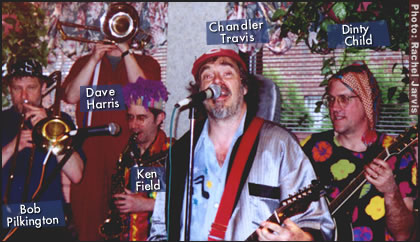
So let's talk about a couple of the other players. How about that fantastic drummer, Rikki Bates?
CT: Oh, yeah. Well, Rikki--I'm the only guy I know who gets to play with his first-choice drummer. Everybody else just gets to dream.
[laughter]
PM: He's a phenomenal player.
CT: Yeah, yeah. And a true nut. He's been with me, for, damn, almost 30 years.
PM: Wow.
CT: We took a few years off at one point. But he's the best. I mean, especially for musicians. I mean, anybody who is a musician checks him out and just goes, "Oh, my God."
PM: Yeah.
CT: So that's good fun. And part of the thing with Rikki, and part of the thing that's special about the band, in trying to find the right people for the band is trying to find the people that can play with a sense of humor, that can play silly.
PM: Right.
CT: Which is a very tricky thing, really. It isn't if you're born that way. But if you're not, there's nothing you can do.
PM: Right. You can't learn that.
CT: No.
PM: He's a very tonal drummer.
CT: Yeah.
PM: He really gets a lot of notes going on out of his drums. I really like that about him.
CT: Oh, God, yeah.
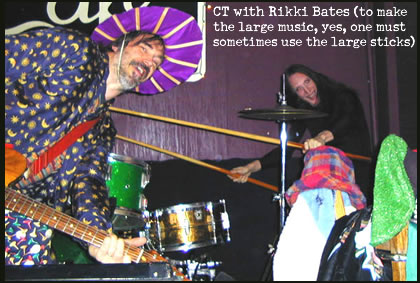
PM: When I was hanging out with him--I mean, when you're talking to a guy who's a cross-dresser, it's like you just keep triple-taking and double-taking, going, "Okay, I don't know exactly how to get with this, but this guy is just unbelievable."
CT: Well, you can understand why I've always wanted to spring him on the Folk Alliance.
[laughter]
PM: Rikki Bates is one of those guys that when you watch him play, he doesn't look like he's making all the sounds he's making. You know what I mean?
CT: Yeah. Which is something you don't see every day, in a drummer or anyone else.
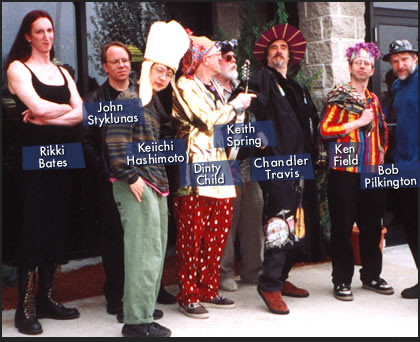
PM: The very existence of the band speaks to an entirely different ethic and motivation than what's generally regarded as the music business today.
CT: Well, yeah, it does. And that's me being lucky enough to do that. My folks are fairly well off, I own my own house, so I have it better than a lot of people. So it's a privilege to get to not worry about how much money I'm making on every gig. Everybody else has to worry about it, just like normal people.
PM: But you don't, and that's nice.
CT: Well, it's very lucky for me, and I hope lucky for my audiences.
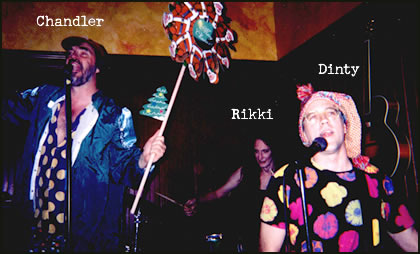
PM: Since he's like the center of the band, let's talk a little bit about Dinty Child. He's a fascinating instrumentalist.
CT: Yeah. Well, he plays everything. He's certainly--I mean, there's a lot of kinship there. We sort of feel like brothers, in a strange way. For one thing, we both really love parts. We both really like the idea of something that's so great that you play that every time. And also Dinty is a terrific guy at knowing that you don't have to play all the time, and that with nine people, in fact, it's really important that you don't play all the time. I've known a lot of terrific players who don't know to lay out a little bit, maybe the verse before your solo, lay out, man, set your stuff up. Some guys just don't shut up. And in my band it's been a real lesson in that. I mean, we've got three rhythm players, we've got keyboard and myself and Dinty, so we really can't be all clattering away all the time.
PM: Ever since I saw him the first time playing in the Folk Alliance hotel room, I've wanted a mandocello. I haven't gotten around to buying one yet.
CT: I know, isn't that the best instrument?
PM: Wow, it's got a great voice.
CT: I was fortunate enough to--there's a guy up here who plays with me sometimes called Tim Dickie, and I actually played with him before I played with Dinty. And another guy who lived like a block from me, named Rich Hardy, who played on one of the early records. And they both played mandocello. So at one point I had access to three different mandocello players, which is just strange.
PM: Crazy. And like where are they getting these mandocellos? I remember hunting one down with Dinty one time. There was a maker whose name now escapes me. Did the other guys--what kind of mandocellos were they playing? Do you know?
CT: Oh, hell no. I have no idea.
PM: I've got to get one of those things.
CT: I know. Aren't they great? And the thing about them that I think is so cool, they're just so strong sounding, man, it's such a rock 'n' roll kind of instrument to me.
PM: And does everybody play it with a plectrum? Or do they fingerpick it, too? Or what--
CT: All my guys have played with it pick. I have no idea what's typical. I really haven't heard mandocello except for these guys that I know. I haven't really heard any on--I mean, I probably have, I suppose, but it's not something I noticed on a record and went, "Oh, we've got to find somebody who does that." I was just really lucky.
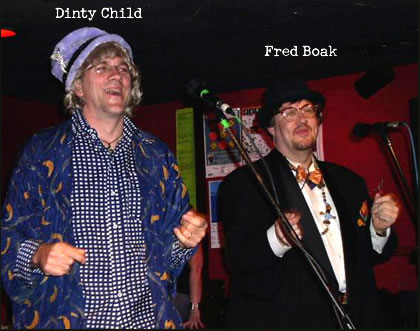
PM: And since he's a big part of the vibe, let's talk about Fred, too, Fred Boak.
CT: Yeah, yeah. Well, Fred came to see us as a fan for like a year or two. And then it was so great to have him around. He started selling merchandise, and then slowly started doing more and more. He's just completely made himself indispensable at this point. He's a lot of help on the web, and he's a great harmony singer, and a terrific presence on stage.
PM: He's an amazing presence on stage.
CT: And he just does more and more every year. And I think in a few more years he'll probably just run the band.
[laughter]
print
(pdf) listen to clips
puremusic home

